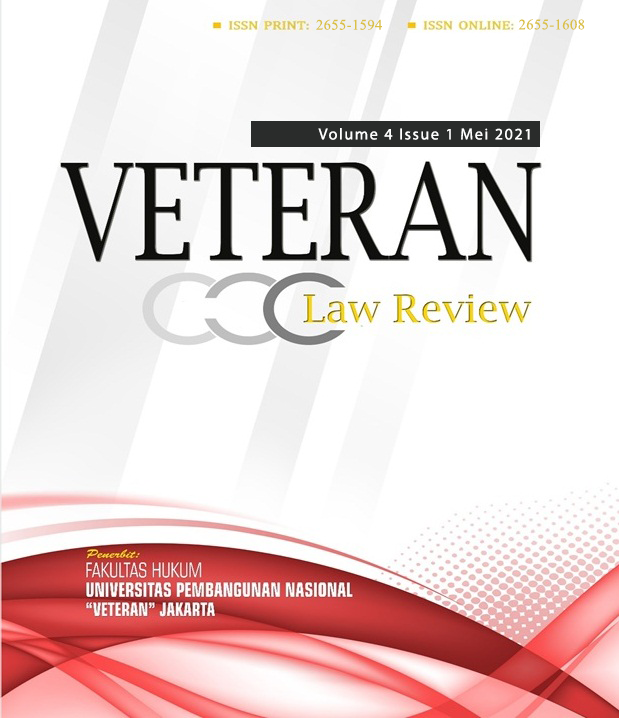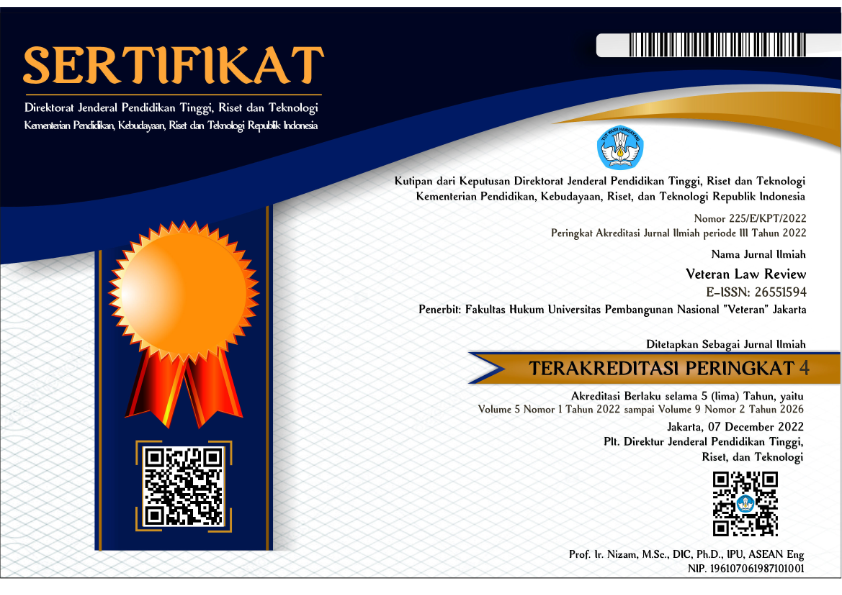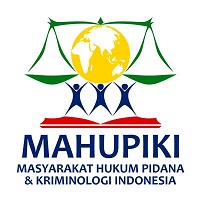Legal Securities Against Privacy Data for Covid-19 Patients in Indonesia
DOI:
https://doi.org/10.35586/velrev.v4i1.2618Abstract
Disclosure issues priva the patient data cov id-19 has a dilemma, on the other hand the patient covid-19 must be protected data privacy of her so as not to spread public consumption because it will be implications negative for patients covid-19 towards economic, social , and -Other if the medical record is disseminated without perse purpose. Thus, the study will also describe a court decision in which a patient sued peme covid 19 Rinta h area who held a press conference on the post itifnya patients covid-19 and also sued one sa tu mass media that reported on k eadaannya. Thus, there are like two sides of a coin, in the other hand patient data privacy must be protected , but on the other hand, information dissemination d ith patient permission dibutuh right to avoid other people her exposed covid-19 , because it takes trace contacts of patients covid-19 so that the virus does not spread. That way, the privacy protection of Covid-19 patient data needs to be studied to answer this dilemma with the data privacy protection model for Covid-19 patients . The research method used in this research is a normative juridical method using a doctrinal approach. Objective is to familiarize yourself isa setting clicking Enai patient data privacy Covi d -19 in Indonesia and comparative with the protection of the privacy of patient data covid-19 in n egara another. Discussion result study showed that compassion are, whereas the Constitution (Article 28 G paragraph ( 1 )), Article 57 of the Health Act, and some of international convention already ratification in Indonesia, also on the core of her had been arranged that the privacy of the patient should be in the case but there is still a central or regional governments that violate the privacy of patients covid-19 with announce very detail about patient covid-19 data privacy that adversely affects the patient. Refers to protecting the privacy of patient data covid-19 in the EU, UK, US, China, India, Hongkong, Malaysia, and Singapura which ensures it firmly to prevent leakage of data that can be go to the general public so that, right to maintain the privacy of data of covid-19 patient, and the tracking integrated via applications that are already guaranteed securities.
Downloads
References
Ahmad Redi, Ibnu Sina Chandranegara. Segi Hukum Terhadap Implikasi Covid-19 Di Indonesia. Jakarta: Kencana, 2020.
Ardiyanti, Handrini. “Komunikasi Media Yang Efektif Pada Pandemi Covid-19.” INFO Singkat: KAJIAN SINGKAT TERHADAP ISU AKTUAL DAN STRATEGIS DPR RI Vol. XII, no. 7 (2020): 25–30.
Ariany, Farida, and Murtiana Ningsih. “Perlindungan Hukum Terhadap Identitas Pasien Covid 19.” Journal of Chemical Information and Modeling 53, no. 9 (2019): 1689–99.
Artikel Kontroversi Kerahasiaan Data Pasien Covid-19, Advokat Ini Daftarkan Uji Materi ke, and MK. “Kontroversi Kerahasiaan Data Pasien Covid-19, Advokat Ini Daftarkan Uji Materi Ke MK.” Https://Www.Hukumonline.Com/Berita/Baca/Lt5e79914cdc110/Kontroversi-Kerahasiaan-Data-Pasien-Covid-19-- Advokat-Ini-Daftarkan-Uji-Materi-Ke-Mk, n.d.
BPKN. “Perlindungan Data Pribadi Pasien Covid-19 Menjadi Hak Privasi Konsumen.” https://bpkn.go.id/posts/show/id/2020, 16932.
Bradford, Laura, Mateo Aboy, and Kathleen Liddell. “COVID-19 Contact Tracing Apps : A Stress Test for Privacy , the GDPR , and Data Protection Regimes,” no. May (2020): 1–21. https://doi.org/10.1093/jlb/lsaa034.
Cynthia Hadita. “Registrasi Data Pribadi Melalui Kartu Prabayar Dalam Perspektif Hak Asasi Manusia (Provision of Personal Information in Prepaid SIM Card Registration from Human Rights Perspective).” Jurnal HAM 2, no. Desember 2018 (9AD).
Dewi Rosadi, Sinta, and Garry Gumelar Pratama. “Urgensi Perlindungandata Privasidalam Era Ekonomi Digital Di Indonesia.” Veritas et Justitia 4, no. 1 (2018): 88–110. https://doi.org/10.25123/vej.2916.
Efendi, Joenaidi, and Johnny Ibrahim. Metode Penelitian Hukum (Normatif Dan Empiris). Jakarta: PrenadaMedia, 2018.
Eka N.A.M. Sihombing, Eddy Purnama, Budiman Ginting, Faisal Akbar Nasution. “The Regional Regulation Concerning Management Of Zakat Viewed From The Principles Of Formulation Of Legislation.” International Journal of Advanced Science and Technology 29, no. 6 (2020).
Eka N.A.M Sihombing, Cynthia Hadita. “Analisis Wacana Hukuman Pancung Di Provinsi Aceh.” Jurnal Legislasi Indonesia 6, no. 4 (2019).
Ekong, Iniobong, Emeka Chukwu, and Martha Chukwu. “COVID-19 Mobile Positioning Data Contact Tracing and Patient Privacy Regulations : Exploratory Search of Global Response Strategies and the Use of Digital Tools in Nigeria Corresponding Author :” 8 (2020): 1–7. https://doi.org/10.2196/19139.
ELSAM. “Data Privasi Pasien Covid-19.” https://elsam.or.id/perlu-kesetimbangan-perlindungan-privasi-dan-kesehatan-publik-dalam-penanganan-covid-19/, 2020.
Ghose, Anindya, Beibei Li, Meghanath Macha, Chenshuo Sun, and Natasha Zhang Foutz. “Trading Privacy for the Greater Social Good: How Did America React During COVID-19?,” 2020.
Haganta, Raphael. “Legal Protection of Personal Data As Privacy Rights Of E-Commerce Consumers Amid The Covid-19 Pandemic” 4, no. 2 (2020).
Id, Stephan Lewandowsky, Simon Dennis, Andrew Perfors, Yoshihisa Kashima, Joshua P White Id, Paul Garrett, Daniel R Little, and Muhsin Yesilada. “Public Acceptance of Privacy-Encroaching Policies to Address the COVID-19 Pandemic in the United Kingdom,” 2021, 1–23. https://doi.org/10.1371/journal.pone.0245740.
Kapa, Suraj, John Halamka, and Ramesh Raskar. “Contact Tracing to Manage COVID-19 Spread—Balancing Personal Privacy and Public Health.” Mayo Clinic Proceedings 95, no. 7 (2020): 1320–22. https://doi.org/10.1016/j.mayocp.2020.04.031.
Kolfschooten, Hannah van, and Anniek de Ruijter. “COVID-19 and Privacy in the European Union: A Legal Perspective on Contact Tracing.” Contemporary Security Policy 41, no. 3 (2020): 478–91. https://doi.org/10.1080/13523260.2020.1771509.
Muhammad Yusrizal Adi Syaputra, Dani Sintara. “Revitalization of Malay Cultural Values in Regional Regulation of Spatial and Region in Medan City.” Budapest International Research and Critics Institute-Journal (BIRCI-Journal) 2, no. 3 (2019).
Palupi Kurnianingrum, Trias. “Pelindungan Data Pribadi: Dapatkah Hasil Tes Swab Rizieq Shihab Dibuka?” Pusat Penelitian Badan Keahlian DPR RI, 2020, 1–6. http://berkas.dpr.go.id/puslit/files/info_singkat/Info Singkat-XII-24-II-P3DI-Desember-2020-214.pdf.
Ponjong, Pemerintahan. “Perlindungan Hukum Terhadap Identitas Pasien Covid-19.” https://www.ponjong.desa.id/, 2020.
Prananda, Rahandy Rizki. “Batasan Hukum Keterbukaan Data Medis Pasien Pengidap Covid-19: Perlindungan Privasi VS Transparansi Informasi Publik.” Law, Development & Justice 3, no. 1 (n.d.).
Rianarizkiwati, Nenny. KEBEBASAN INFORMASI versus HAK ATAS PRIVASI, Tanggung Jawab Negara Dalam Perlindungan Data Pribadi. Depok: Infermia Publishing, 2020.
Sari, Haryanti Puspa. “Amnesty: Pengungkapan Data Pasien Virus Corona Langgar Hak Privasi.” https://nasional.kompas.com/, 2020.
Septianto, Bayu. “Jokowi Minta Privasi Pasien Positif Corona COVID-19 Dijaga.” https://tirto.id/jokowi-minta-privasi-pasien-positif-corona-covid-19-dijaga-eCCr, n.d.
Sihombing, Eka N.A.M. “Eksistensi Paralegal Dalam Pemberian Bantuan Hukum Bagi Masyarakat Miskin (The Existence of Paralegals in Providing Legal Aid to the Poor),.” Jurnal Ilmiah Penegakan Hukum 6, no. 1 (2019).
Soebroto, Arif Christiono. “Kedudukan Hukum Peraturan/Kebijakan Dibawah Peraturan Menteri Perencanaan Pembangunan Nasional/Kepala Bappenas,” no. 3 (n.d.): 1–15.
Wulansari, Eka Martiana. “KOSEP PERLINDUNGAN DATA PRIBADI SEBAGAI ASPEK FUNDAMENTAL NORMDALAM PERLINDUNGAN TERHADAP HAK ATAS PRIVASI SESEORANG DI INDONESIA.” Surya Kencana Dua: Dinamika Masalah Hukum Dan Keadilan 5, no. 1 (2018): 332–51.
Xu, Hao, Lei Zhang, Oluwakayode Onireti, Yang Fang, William Bill Buchanan, and Muhammad Ali Imran. “BeepTrace: Blockchain-Enabled Privacy-Preserving Contact Tracing for COVID-19 Pandemic and Beyond.” ArXiv 8, no. 5 (2020): 3915–29. https://doi.org/10.1109/jiot.2020.3025953.
Yuniarti, Siti. “Perlindungan Hukum Data Pribadi Di Indonesia.” Business Economic, Communication, and Social Sciences (BECOSS) Journal 1, no. 1 (2019): 147–54. https://doi.org/10.21512/becossjournal.v1i1.6030.
Zeinalipour-Yazti, Demetrios, and Christophe Claramunt. “COVID-19 Mobile Contact Tracing Apps (MCTA): A Digital Vaccine or a Privacy Demolition?,” no. Mdm (2020): 1–4. https://doi.org/10.1109/mdm48529.2020.00020.
Downloads
Published
How to Cite
Issue
Section
License
Copyright (c) 2022 Veteran Law Review Journal
Veteran Law Review © 2022 by Faculty of Law Universitas Pembangunan Nasional "Veteran" Jakarta is licensed under Creative Commons Attribution 4.0 International

1. License
The non-commercial use of the article will be governed by the Creative Commons Attribution license as currently displayed on Creative Commons Attribution 4.0 International.
2. Author(s)' Warranties
The author warrants that the article is original, written by the stated author(s), has not been published before, contains no unlawful statements, does not infringe the rights of others, is subject to copyright that is vested exclusively in the author, and free of any third party rights, and that any necessary written permissions to quote from other sources have been obtained by the author(s).
3. User/Public Rights
VELREV's spirit is to disseminate articles published are as free as possible. Under the Creative Commons Attribution-ShareAlike 4.0 International License. VELREV permits users to copy, distribute, display, and perform the work for non-commercial purposes only. Users will also need to attribute authors and VELREV to distributing works in the journal and other media of publications.
4. Rights of Authors
Authors retain all their rights to the published works, such as (but not limited to) the following rights;
- Reproduce the work
- Prepare derivative works based upon the work
- Distribute copies of the work
- Perform the work publicly
- Display the work publicly
- Copyright and other proprietary rights relating to the article, such as patent rights,
- The right to self-archive the article,
- The right to enter into separate, additional contractual arrangements for the non-exclusive distribution of the article's published version (e.g., post it to an institutional repository or publish it in a book), with an acknowledgement of its initial publication in this journal (Veteran Law Review).
5. Co-Authorship
If the article was jointly prepared by more than one author, any author submitting the manuscript warrants that he/she has been authorized by all co-authors to be agreed on this copyright and license notice (agreement) on their behalf, and agrees to inform his/her co-authors of the terms of this policy. VELREV will not be held liable for anything that may arise due to the author's internal dispute. VELREV will only communicate with the corresponding author.
6. Royalties
Being an open accessed journal and disseminating articles for free under the Creative Commons license term mentioned, author(s) are aware that VELREV entitles the author(s) to no royalties or other fees.
7. Miscellaneous
VELREV will publish the article (or have it published) in the journal if the article’s editorial process is successfully completed. JOSI's editors may modify the article to a style of punctuation, spelling, capitalization, referencing, and usage that deems appropriate. The author acknowledges that the article may be published so that it will be publicly accessible and such access will be free of charge for the readers as mentioned in point 3.


















